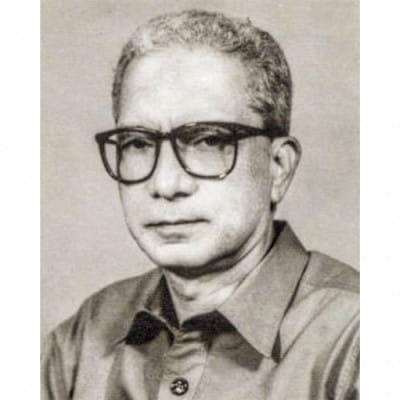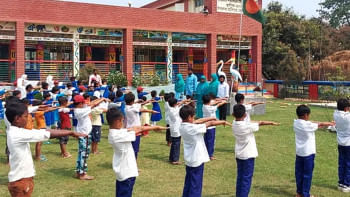A life dedicated to public service

Shegufta Bakht Chaudhuri, popularly known as SB Chaudhuri, the former Governor of Bangladesh Bank, passed away on November 11 at United Hospital, Dhaka. He had dedicated his life to public service since 1955 after he passed the Central Superior Service Examination in erstwhile Pakistan and joined the Pakistan Taxation Service. His life since then was one of high honours and prestigious assignment here and abroad. He held senior positions in the governments of Pakistan and Bangladesh and had the unique distinction of serving as the Chief Controller of Exports and Imports in both Pakistan and post-Liberation Bangladesh. He was survived by his wife and two children.
SB Chaudhuri was born on September 1, 1931 in Bongaon in Nabiganj Thana of Sylhet. His father was Dewan Mamun Chaudhuri and his paternal grandfather was Khan Bahadur Wasil Chaudhuri. His mother, Syed Zebunessa Khatun was the daughter of Khan Bahadur Syed Sikandar Ali, and a sister of Syed Mujtaba Ali, the eminent writer. He passed his Matriculation Examination from Sylhet Government School, Intermediate of Arts from Murari Chand College, Sylhet, BA (Honours) in Economics from Dhaka University (in 1951) and Masters in Public Administration from Harvard University (in 1967).
SB Chaudhuri was one of the few economists in Pakistan and Bangladesh who worked in moulding economic policy in different capacities in the civil administration and shaped the financial, trade and taxation policies for almost five decades. Early in his career in 1964, he was selected for the Economic Pool in the central government administrative cadre and made his mark as an efficient, diligent and brilliant administrator. He was promoted to the position of Chief Controller of Exports and Imports in Islamabad at the young age of 38 in 1970. After Bangladesh's independence, he earned the trust of all regimes and served as Chairman Board of Revenue (1983-1987), Secretary, IRD, and Chief Controller of Exports and Imports. He worked tirelessly to protect the interests of an emerging nation and to keep the country moving forward. Personally, he was shy and modest, as many of his colleagues have unanimously acclaimed, but did not flinch from voicing his opinion during the turmoil that followed the Liberation of Bangladesh. He left his indelible mark in an era when the world and the country were going through enormous changes in the 15 years following our independence, i.e. 1972-1987, and played a major role in many key areas and articulated his judgement and knowledge as a trained economist in taxation, foreign exchange, trade and economic policies.
SB Chaudhuri took over as the fourth Governor of Bangladesh Bank on April 12, 1987 and served with distinction until December 19, 1992. With his steady hand at the helm of Bangladesh Bank, the financial and business sectors flourished and his moral reassurance facilitated a smooth transition from the long rule of General Ershad to the first years of emerging democracy under the new Prime Minister Khaled Zia. During these five years and eight months, with SB Chaudhuri at the steering wheel, Bangladesh Bank was able to manage the money supply efficiently leading to steady growth of the economy, while keeping the inflation at a modest level allowing commercial and state-owned banks to enhance lending to small and medium enterprises.
Former Chief Justice Habibur Rahman, the first chief advisor of the first caretaker government in 1996 appointed SB Chaudhuri as an adviser with the portfolios of industries, commerce, jute and textiles.
SB Chaudhuri who was the first cousin of SM Ali, the founding editor of The Daily Star tried his hand in journalism at the beginning of his professional career. After getting out of the University, he worked for The Morning News in 1951 and then wrote a column in The Daily Star, named "Along My Way" for four years. During my last visit to Dhaka two years ago, I visited SB Chaudhuri, who was my mother's first cousin and was known to his family as Tawfiq, at his Dhanmandi home and asked him, "Mama, what was your biggest career achievement?" He paused for a few seconds, and replied in his customary modest manner, "That is for you and posterity to judge. But for me, it was to stay on track, on mission and keep out of the limelight."
Tributes for SB Choudhuri have been pouring in from across the nation. The current Governor of Bangladesh Bank, Fazle Akbar said, "As a leader of the central bank, he successfully and responsibly overcame several unique challenges in the financial sector". Dr Farashuddin, who followed SB Chaudhuri as the Governor of Bangladesh Bank a few years later, expressed his respect for and appreciation of the role of the latter. "He was an honest, capable, hard-working, and principled Governor. He exhibited his talent in the formulation and execution of the principles that guide the central bank of the country."
Dr Abdullah Shibli is an economist and currently works in information technology. He is also Senior Research Fellow, International Sustainable Development Institute (ISDI), a think-tank in Boston, USA.

 For all latest news, follow The Daily Star's Google News channel.
For all latest news, follow The Daily Star's Google News channel. 



Comments